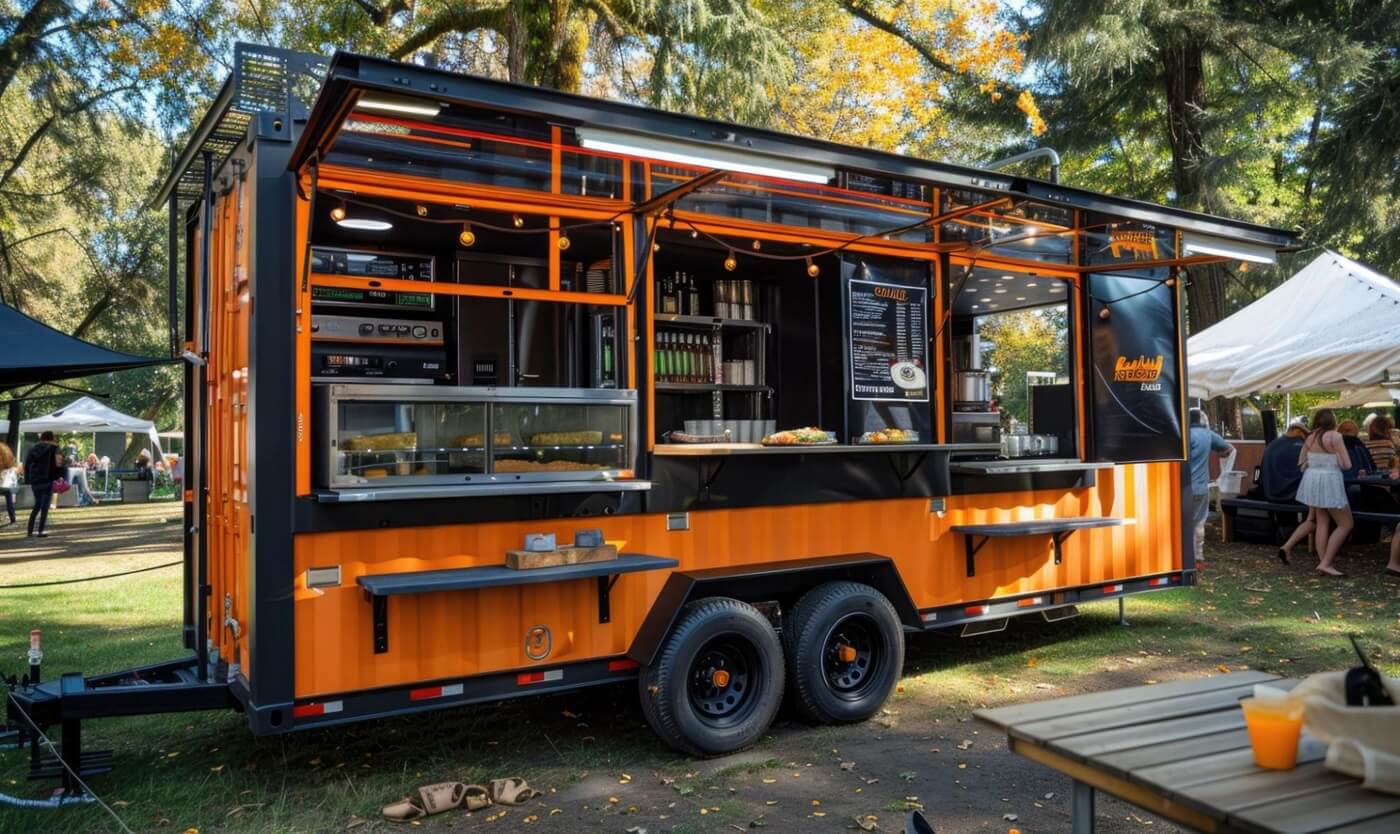When trying to decide whether to choose a food truck or food trailer for your business, there are a range of different criteria that you need to consider. In this article, we’re going to do a detailed comparison of a food trailer vs. a food truck.
When we’re done, you should be able to determine exactly which option is better for you and the advantages and disadvantages of each.
Key Points
- The main difference between a food truck vs. a trailer is that food trucks are self-propelled while you can’t move a food trailer without a tow vehicle.
- Food trucks offer excellent space and greater mobility, and can often even fit a smaller commercial kitchen with ease.
- Food trailers are more affordable, fully customizable, and can continue to operate even when mechanical difficulties occur.
Food Trucks
Over the past decade, food trucks have become a significant part of the food and hospitality industry. From taco trucks to trucks that only serve gourmet organic cuisine, there are trucks out there for every personality and preference.
But how do they compare to food trailers? When you’re deciding whether to buy a food truck or trailer, you need details. Let’s take a closer look at the pros and cons of buying a food truck.
Advantages of Food Trucks
There are many excellent advantages to using a food truck, largely based on their size and self-propelled nature.
For one thing, they offer far greater mobility than food trailers. Since they have their own engines, it’s easy to move them to different locations. As a result, you can easily use them to serve different neighborhoods on different days. It also makes it easier to cater at a wide array of events and festivals.
Another major advantage offered is that they can have more storage space and equipment space. However, that isn’t a universal truth. Since food trailers are highly customizable, and you can choose from different trailer types, they can sometimes give more space value.
That said, many people believe that food trucks are more spacious and leave room for a wider range of food preparation and storage options.
Food trucks are also advantageous in that they’re highly maneuverable. Because they’re not a separate attachment being pulled by a tow vehicle, food trucks can be easier to navigate through crowded areas, parking lots, and festivals where there are many booths.
Disadvantages of Food Trucks
As with most things, food trucks aren’t perfect. You may discover a range of different disadvantages when you look into it.
The greatest disadvantage of food trucks is that the initial purchase costs are much higher than for food trailers. To some degree, the self-propelled nature of the trucks makes up for it since you don’t have the additional cost of getting a tow vehicle.
Food trucks can also be more expensive to maintain in general. They require far more maintenance that needs to occur regularly. For example, you need to pay for vehicle inspections, repairs, and licensing, all of which can add to operating costs.
Apart from the financial aspect of the abovementioned licensing and inspections, food trucks require more paperwork and permits in general. Health permits, business licenses, and zoning permits are just a few of the permits and licenses that a food truck may require. As a result, using a food truck can be a more complex process than running a business using a food trailer.
One of the most pronounced problems with food trucks is the fact that they have such great potential for downtime due to mechanical issues. Their greatest advantage can also be their greatest disadvantage. Because they are self-propelled, food trucks can be subject to mechanical breakdowns. This means that when the truck breaks down, it can lead to downtime and lost business if not addressed promptly.
Food Trailers
Food trailers are another common form of movable restaurant and eatery. They may not be self-propelled like food trucks, but this actually leads to a range of unanticipated benefits. Let’s take an objective look at the pros and cons.
Advantages of Food Trailers
There are many significant benefits to buying a food trailer for your business. Let’s take a closer look at the potential benefits.
First of all, because the food trailer doesn’t come with a propulsion unit, it has a considerably lower initial cost. This lower upfront cost (compared to food trucks) makes them a more affordable entry-level option for many dreamers and entrepreneurs.
As with the general costs, the maintenance costs can be considerably lower on a food trailer than on a food truck. Often, the lack of mechanical complexity leads to lower operating costs. The same is often true with insurance premiums for these trailers, as they’re considered to have fewer associated risks.
Food trailers are sometimes considerably more complex than their mechanical counterparts, offering great flexibility in terms of size and design. Because they come in various sizes and are fully customizable, they offer more flexibility in terms of layout and equipment.
Another advantage is that it’s often easier to park a food trailer and leave it for the duration of an event.
Disadvantages of Food Trailers
Food trailers aren’t entirely without their disadvantages, though these may be less than in the case of food trucks.
The most significant disadvantage in the case of food trailers is that they require a separate towing vehicle. This means that they’re often less maneuverable and that there may be an additional cost associated with your upfront setup fees.
In certain areas, you may also require additional permits or documentation before you can legally tow a food trailer.
Finally, some people have concerns about the safety of unattended food trailers, especially in unsecured areas. However, they’re fairly easy to secure, and this can be worked around.
Factors to Consider When Choosing
When you’re trying to choose between a food truck or a food trailer, it’s important to gauge the options in terms of your business needs. Below, we’ll discuss the different considerations you need to bear in mind before making a decision.
Your Budget
The first and most obvious consideration is your available budget. There are several aspects to consider here.
First, you need to find out what the upfront costs would be for both a food truck and a food trailer, including any necessary modifications or customization. That will give you a base cost to start the comparison,
However, that’s only the start of the comparison. You’ll also need to do research about what the insurance premiums are for both food trucks and food trailers. This can play a significant role in deciding which one will be more affordable.
Also, take the time to consider the cost of a towing vehicle if you don’t have one. If you have a well-maintained tow vehicle to pull a trailer, this is a moot point. But, if you need to purchase a vehicle for pulling a trailer, you need to consider that as well.
Your Business Goals
You also need to consider your business goals to see which option will suit it better.
First, consider how much mobility you require. Do you need a highly mobile vehicle like a food truck, or are you planning to remain stationary for long time periods? If you’re planning on remaining stationary, a food trailer will work well.
You also need to consider your target audience and whether they’d be more likely to visit a food truck or a food trailer.
In the end, the type of catering you plan to do and the expectations of your clientele are the main determining factors here.
Your Space Requirements
When trying to choose between these two options, it’s essential that you consider your space requirements.
First, determine how much storage space you need for food, equipment, and supplies. Then, decide how much workspace you require for food preparation and serving.
When you’ve considered these two things, you’ll have a fairly accurate idea of how much space you require. If you require fairly little space, you can easily opt for a smaller food trailer. However, food trucks are generally considered better for larger space requirements.
That said, the sheer number of different trailer options, as well as their extreme customization requirements, mean that food trailers often give you more value within the same amount of space. Larger trailers are often also comparable to the size of food trucks.
Conclusion
There are many factors to consider when trying to decide between a food truck vs. a trailer. However, by considering the needs of your business along with the food truck vs food trailer pros and cons, you can easily determine which option is better for you.
In this article, we’ve discussed all the pros and cons in detail, so you should be able to find the right fit for your business with ease. Feel free to contact us if you’d like more information about food trailers and what they can do for you.
We offer fully customizable trailers and would be happy to help you build the trailer your dream deserves. From the kitchen to the serving area, we can build it to your specifications. You can also
browse our inventory for a full range of ready-to-go trailers.
Bibliography
The rise of the food truck phenomenon: an integrated model of consumers’ intentions to visit food trucks
A Brief History of Food Trucks

